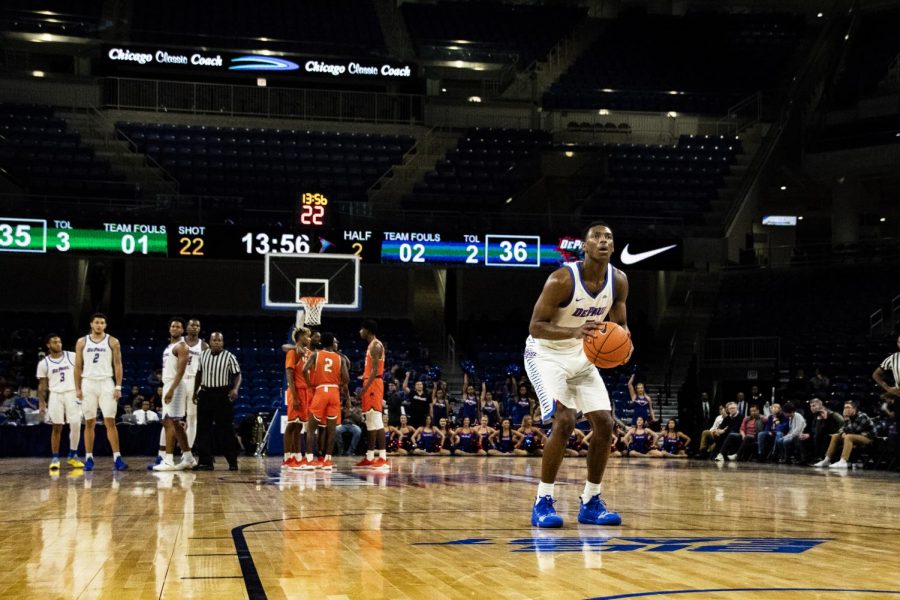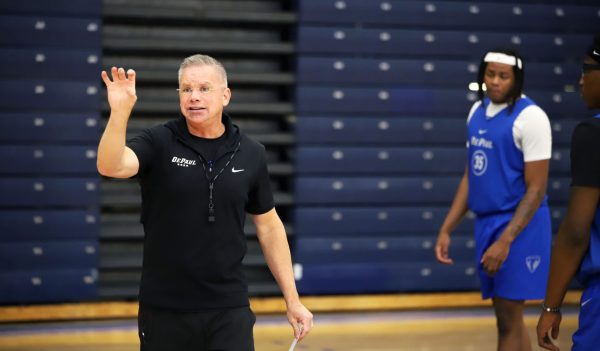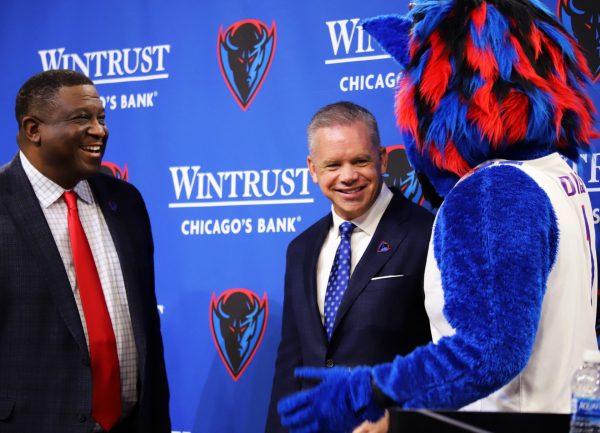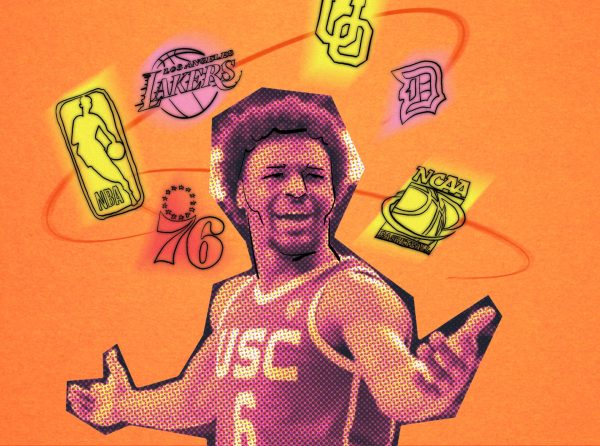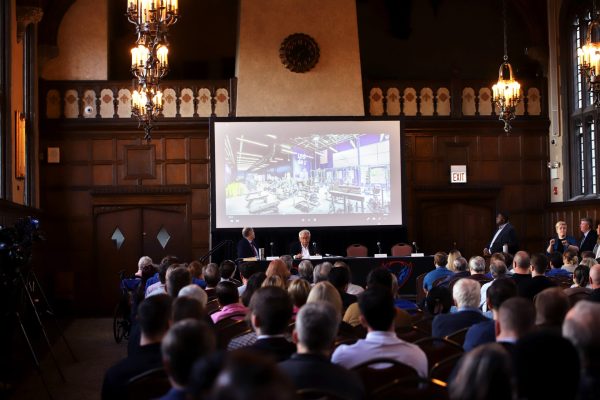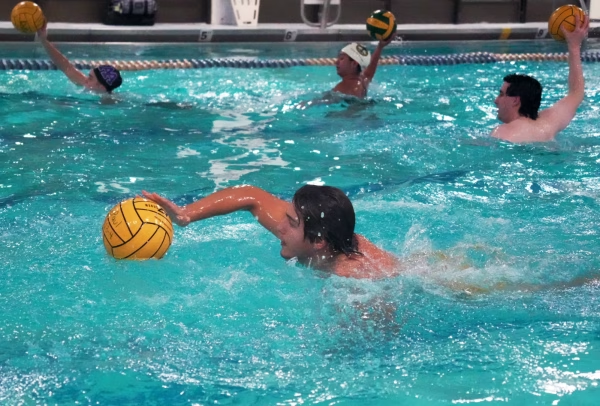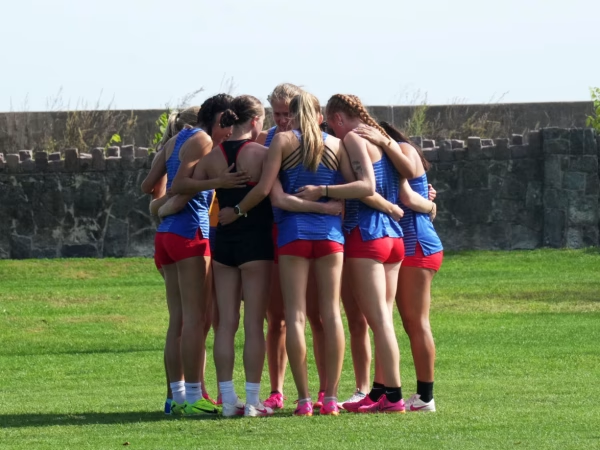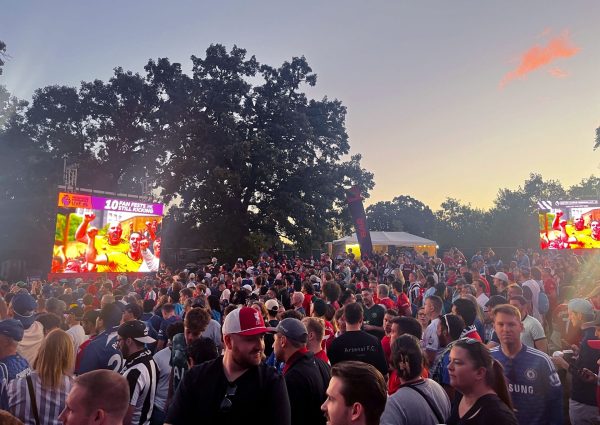Transfer talk: Out of necessity, Blue Demon transfers integrating quickly
DePaul guard Jalen Coleman-Lands attempts a technical free throw against Florida A&M. Richard Bodee I The DePaulia
The transfer player movement across college basketball has potently affected the DePaul Blue Demon men’s basketball team the last two seasons.
In 2017-2018, transfer players comprised 60 percent of the Blue Demons starting lineup (Max Strus, Tre’Darius McCallum, and Marin Maric). At the end of the season, two Blue Demon players transferred away from the program. Freshman point guard Justin Roberts migrated south to Georgia State. Defensive stalwart Brandon Cyrus retreated to the University of California, Santa Barbara.
This season Jalen Coleman-Lands, who transferred over from the University of Illinois before the 2017-2018 season, is eligible to play for the Blue Demons after sitting out a year per customary transfer player protocol. Because he is a graduate student, Blue Demon big man Femi Olujobi has been immediately eligible to play this season after transferring over from North Carolina A&T. On the other hand, Arkansas transfer Darious Hall will sit out this season (again normal transfer protocol for non-graduate students) and have sophomore eligibility when he makes his Blue Demon debut in 2019-2020.
Weaving transfer players into the fabric of a basketball team always is a process. But with the rotation only running about seven deep right now, the Blue Demons don’t have the luxury of easing Olujobi and Coleman-Lands through this process slowly. Both have played big minutes (Olujobi 23.5 minutes per game; Coleman-Lands 31.2 minutes per game), have usage percentages above 16 percent, and Coleman-Lands has started all six games the Blue Demons have played.
Both have played key roles this season and will continue to play key roles as two of the seven guys Leitao has trusted to play significant minutes this season.
Jalen Coleman-Lands
The bread and butter of Coleman-Lands game is his 3-point shot.
His presence in the lineup this season was a big reason why many players as well as Leitao were optimistic that the Blue Demons could turn 3-point shooting from a weakness into a strength.
So far, the hope hasn’t materialized. Coleman-Lands carries his worst 3-point shooting percentage of his career (23.7 percent) and the Blue Demons have collectively shot the ball from 3-point land at a 28.9 percent clip (314th in the country). Nonetheless, the cold shooting to start the season doesn’t mean that Coleman-Lands doesn’t feel comfortable in this new offense or in sync with his new teammates.
“Honestly, I feel like this is my team,” Coleman-Lands said after he scored a season-high 15 points against Cleveland State. “They help me play my game and get more confident. My coach and my team have helped me everyday and have helped make the transition easier.”
Because he has the reputation as a 3-point shooter due to his body of work at Illinois (158-for-393; 40.2 percent in two seasons), opponents are still reticent to help too far off of him. It’s difficult to quantify how much of the Blue Demons 7.2 percent uptick in 2-point field goal percentage this season compared to last is the result of teams not being able to clog the lanes because they are worried about Coleman-Lands. But, you have to imagine there’s some correlation.
If this is indeed his impact when he’s not shooting well, imagine how much better the offense would look if Coleman-Lands finds his stroke from deep.
”He’s not the only guy who as days go by, weeks go by, who is getting more comfortable with making shots which he has done his whole life,” Leitao said. “He’s the most glaring guy because he’s a shooter and he hasn’t been making shots but I think there’s a lot of guys trying to find their way still. We’ve got until the Big East season to kind of figure out ourselves as it relates to the group. If Jalen is struggling I got to understand how to get him a great shot and all those things within the group dynamic that we’re talking about. I thought he shot the ball better but he’s still got to grow in terms of our expectation of what he’s capable of doing on both ends of the floor. I think an example for him is us understanding where he can be the most effective. We just need to keep working at it.”
An area where Coleman-Lands has made a tangible impact this season is with mid-range jumpers. He rarely gets all the way to the bucket, but has shot a scorching 53.8 percent (also a career high by a significant margin) on 2-point field goals this season as his pullup game has stood out.
With few other options at shooting guard on the roster right now, an effective Coleman-Lands may remain a key for Blue Demon success moving forward.
Femi Olujobi
With more talented teammates around him than when he was at North Carolina A&T, there are less opportunities for Olujobi. But even though his per 40 minute-counting averages are down so far this season with DePaul, that doesn’t mean it was difficult for him to integrate with his new teammates.
“Honestly, just the way everything transpired I never felt like I was the new guy here,” Olujobi said. “I feel like the team really welcomed me comfortably. I feel like I’ve been here forever, and being able to speak up [as an upperclassman leader] hasn’t been an issue at all. We integrated very fast. Even during the summer once I got here it seemed like I wasn’t an outcast. More so, I was just part of the family immediately.”
A cursory assessment of his per 40 minute stats doesn’t do justice to his impact this season. He’s shooting 68.6 percent from the field (fourth in the Big East Conference) and has earned more trips to the free-throw stripe than ever before (and he’s knocking down the freebies at a 71.4 percent clip). His impact for the Blue Demons culminated with a 16-point, seven-rebound effort against Florida A&M on Monday night.
”When we went to him, he was simplistic,” Leitao said. “I think sometimes [before] he went to options two and three into his moves when he didn’t have to. So I thought he was more definitive about what he was doing when he had the ball in his hands. Guys were looking for him, he got early post-ups, good screening and rolling, and was the recipient of good passing from our perimeter people. He’s able to do that [consistently], I know he has it [in him]. But having games like this, adds not only to his confidence but [to the confidence of] the guys around him that if we give him the ball in space he can do some things.”
“I go out there and contribute wherever I feel I need to contribute to help my team win at the end of the day,” Olujobi added. “My teammates instill a lot of positivity and belief in me. They know what I’m capable of, so I don’t feel like I need to go out there and prove myself or anything like that. It’s just going out there and doing what I need to do to help my team win.”
The minute splits between Olujobi and sophomore big men Paul Reed and Jaylen Butz are nearly identical this season largely because the latter two are better than Olujobi is on the defensive side of the floor.
Nonetheless, the Blue Demons carry just three big men on the roster who have played more than three total minutes this season. Like Coleman-Lands situation at shooting guard, a healthy and effective Olujobi may remains paramount if the Blue Demons are to have success in a season where the rotation runs seven deep.


